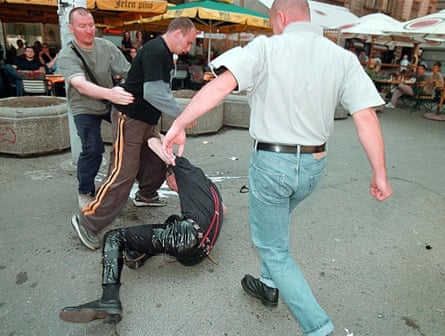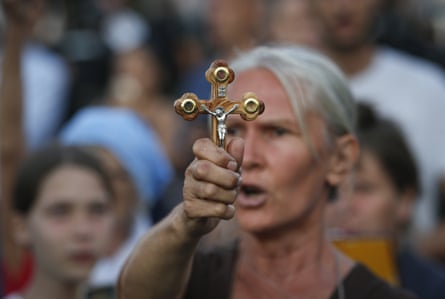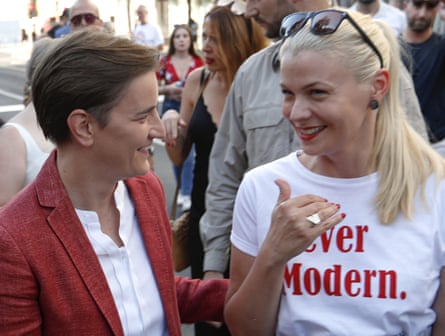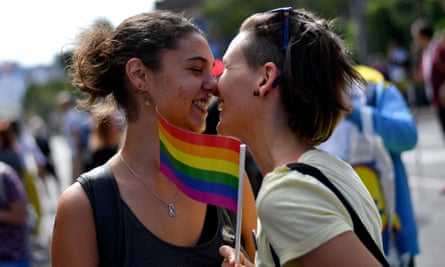‘It’s a win for us’: Serbia’s canceled EuroPride exposes ongoing LGBTQ+ struggle | LGBTQ+ rights
In June 2001, nine months after the overthrow of autocratic Serbian President Slobodan Milošević, the Serbian capital, Belgrade, attempted to hold its first Pride Parade. The event, which organizers had envisioned as a celebration of a new progressive era, turned into a chaotic nightmare.
News pictures from that day shows groups of young men marching through the capital, chanting “kill, kill, kill a poof”. Ultras from Belgrade’s biggest football clubs momentarily put aside tribal animosities and rioted across the city, beating parade spectators and brawling with police, seriously injuring two officers.
This week, authorities in Belgrade shut down EuroPride, the continent’s flagship event on the LGBTQ+ calendar. The pan-European festival opened in the Serbian capital on Monday, with organizers hoping it would serve as a measure of progress since 2001. But a last-minute police ban on Saturday’s EuroPride paradethe planned culmination of the week-long program, highlighted the ongoing struggle for equality in the Balkans.
Tensions have surrounded the event since Serbian President Aleksandar Vučić announced last month that EuroPride should be canceled, for fear that right-wing protests could lead to violent clashes. Vučić said he regretted it, but cited a worsening security crisis with neighboring Kosovo and economic pressures among other reasons for postponing EuroPride to “happier times”.
On Sunday, anti-pride protesters including biker gangs, religious groups and far-right nationalists gathered in the capital ‘for marriage and family’, demanding a ban on the EuroPride parade.
Pride organizers remained defiant, saying the Serbian government had no legal power to cancel. A first day of scheduled events passed without incident on Monday, but on Tuesday police banned Saturday’s parade, along with any counter-demonstrations.
Kristine Garina, Latvian president of the European Association of Pride Organisers, said organizers were appealing the ban in court. Either way, she said, a public gathering of some kind would take place on Saturday. Up to 10,000 people were expected in Belgrade for the parade.
“All we need is for the justice system to work in Serbia and for the rule of law to be respected,” she said.
Belgrade was chosen over Barcelona, Dublin and Lisbon to host EuroPride 2022. Marko Mihailović, the 29-year-old Belgrade Pride figurehead, led the city’s winning bid.
“That [cancellation] shows the need to host EuroPride in Belgrade,” said Mihailović. “The idea when we first submitted our bid in 2019 was exactly this: to present EuroPride in a country that really needs it. We wanted to draw attention to the systematic discrimination and the lack of political will to solve problems facing the community.

He said tolerance had increased in the Serbian capital but less beyond. “Visibility has increased – but this progress is only in Belgrade. The rest of Serbia is more homophobic than ever.
Serbia, where same-sex unions are not legal, represented a new frontier for the broader LGBTQ+ movement, Garina said. “After EuroPride visited Warsaw in 2010 and Riga in 2015, Belgrade seemed like a natural next step in terms of politics and complexity.” She said the hope was to “change the whole region and finally get things done for LGBTQ+ rights in the Balkans.”
It’s been a bumpy road even so far. After 2001, activists defiantly tried to reorganize, but city officials canceled year after year, citing security concerns and saying they were unable to ensure the safety of participants.
When Serbia became a candidate for EU membership in 2009, the government came under pressure from Brussels to prove its commitment to democratic values. Organizers got the green light in 2010, but Pride was once again marred by far-right violence and riots. Garina, who was there, recalls that Belgrade “looked like a war zone”.

With a strong police presence, Pride finally moved forward peacefully in 2014. Vučić, a former far-right radical, became prime minister that year after moderating his policies and gaining support from EU bigwigs.
In 2017, Vučić even named gay politician Ana Brnabić as his replacement as prime minister when he became president. Yet little has been done for LGBTQ+ people in Serbia. Civil partnerships that give same-sex couples the same rights as married couples, for example, remain non-existent.
And while local far-right activists seem to have quietly accepted defeat at Belgrade Pride, a moderate, small-scale annual event, the ferocity of their opposition to EuroPride reveals that social attitudes are not vastly different. from 2001.

The strongest and most consistent opposition to LGBTQ+ rights in Serbia has come from Dveri, a party of far-right religious conservatives who often hold a “family values parade” on Belgrade Pride Day as a counter -demonstration. This year the party pushed for a parliamentary vote to ban Pride and, when that failed, it staged protests. Dveri said public funds allocated to EuroPride should be redirected to treating sick children.
“More than 85% of Serbian citizens are against the promotion of homosexuality and pride, that’s the problem here,” said Andrej Mitic, Dveri’s mild-mannered international secretary. “We see this as the tyranny of an extreme minority trying to impose their own values at odds with the collective moral values of society.”
Mitic said Dveri members weren’t against human rights or anti-discrimination laws protecting LGBTQ+ people in the workplace, for example, but opposed “the promotion of ideological homosexuality” that Pride represented.
Although Dveri is a negligible force in national politics – the party won just 4% of the vote in this year’s elections – a super majority of parliamentary seats are held by right-wing parties that have no electoral incentive improve LGBTQ+ rights. A large number of influential far-right movements have expressed their opposition to EuroPride in recent months, which may have led Vučić to cancel the event.

Mihailović and the other organizers saw EuroPride 2022 as a chance to bring the event back to its political roots and remind attendees across Europe that Pride is not just about celebrating. But he said the risk of a violent backlash has increased this year.
“There have been more right-wing extremists spreading lies and malicious conspiracy theories in the media than in previous years,” he said. “Hate speech has been much more widespread, there have been calls for violence, calls for the use of weapons to stop Pride – no one has even been detained or questioned about it, let alone prosecuted.”
So far, it seems that the extremists have succeeded. However, Mihailović remains defiant and says the far right did not win. “Absolutely not. This is actually a win for us because it exposes all the flaws in our system and the reality of the people who are in power. This is by no means a loss.”
But at the same time, he expresses fears about the future of the battle for equality in the country. “I’m more concerned about next year,” he admits. “Next year, we will not have the visibility that we have this year. If it’s so bad this year, then I’m afraid of what will happen next year.


Comments are closed.